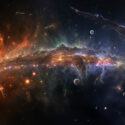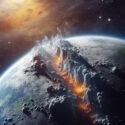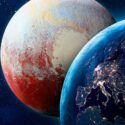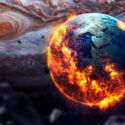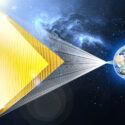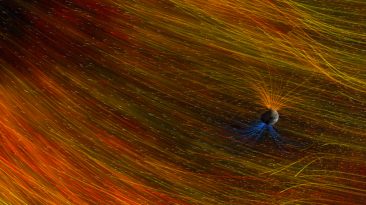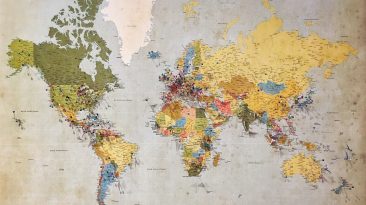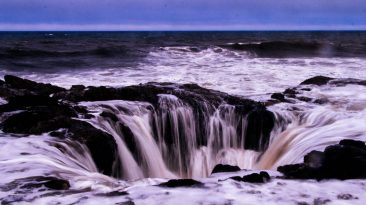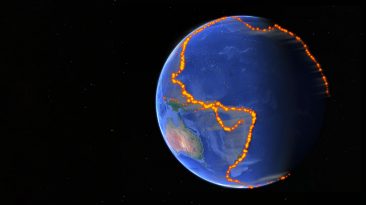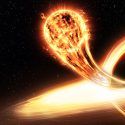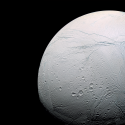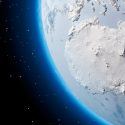1.3 billion years ago, two orbiting massive black holes, circling each other at 250 times a second, collided in a violent, universe-rippling explosion that sent waves of energy throughout the cosmos. In its wake, a new supermassive black hole formed over 60 times bigger than our Sun.
Fast forward to September 2015, gravitational waves from this ancient cosmic event finally struck Earth. Luckily, the gravitational waves weakened over such a great distance. But what if we weren’t so lucky? If a couple of black holes in our solar system collided, could we survive?
What would happen to Earth if we got hit by massive gravitational waves? What causes these waves? How can we detect them?
In 1916, Albert Einstein made waves himself with his groundbreaking theory of general relativity, known famously by the formula E=MC2, or energy equals mass times the speed of light squared. He proved energy and mass are interchangeable, and that space, or ‘spacetime,’ curves in relation to the energy and momentum of whatever matter and radiation are present.
With great foresight, Einstein inferred the collision of black holes or massive stellar objects create distortions in gravity which are pushed out in all directions. Thanks to incredible developments in atomic measurement, scientists in Washington and Louisiana, in the U.S., at the Laser Interferometer Gravitational-Wave Observatory, or LIGO for short, were able to detect and measure the first ever gravitational waves here on Earth in 2015.
This was a historic moment in science, as it was the first definitive proof of Einstein’s theory of relativity. Using laser interferometry, observatories can detect a change less than ten-thousandth the diameter of a proton. That’s one million times smaller than the width of a human hair. Since then, LIGO has measured 50 detections of gravitational waves. So what exactly is causing these waves and could they be catastrophic?
There are many sources of gravitational waves, including the collision of black holes, the rotation of asymmetrical neutron stars, supernovae or even remnants of gravitational radiation caused by the Big Bang. These waves travel at the speed of gravity, equal to the speed of light, and emanate outward in all directions. Like a rock being thrown in a pond, the ripples it creates dissipate over great distances and become smaller and smaller.
Luckily, in our pocket of the universe, we are over 400 million light years away from any orbiting black holes. We’re generally safe, but if these black holes happened to be in our solar system, the implications are much more dire.
When gravitational waves pass through a planet, one side is compressed as the other expands, kind of like squeezing a stress ball. Oh yeah, I could use one of those right now. As a result, time and space itself are stretched causing a slight wobble.
But if we were closer to this violent event and the waves were much bigger, this impact could potentially tear our planet apart, triggering powerful continent-splitting earthquakes, volcanic eruptions and epic storms. Earth wouldn’t really be a habitable place anymore, except for maybe extremophiles like bacteria that thrive in hydrothermal vents.
Let’s imagine our Sun was a neutron star of an imperfect, non-spherical shape, sending gravitational ripples outward as it spins. Earth would likely look more like Io, one of Jupiter’s moons, which is put under great gravitational pressure by Jupiter and, as a result, is one of the most volcanically active moons in the Solar System.
Our landscape would be covered in lava and volcanic fallout with an atmosphere made up of toxic gases like hydrogen sulfide. This would cause massive global warming and intense storms. Constant tsunamis, tornados, and well, you get the idea.
Climate chaos. We can count our blessings we are nowhere near any massive objects shooting out gravitational waves, but thankfully we can still measure them and learn more about the complexities of our universe.
Even though we get hit by gravitational waves, they are generally so small we can’t even feel any impact. But on the flipside, what would it be like if we suddenly lost our gravity?
Subscribe to What-If on YouTube or follow the show on Facebook Watch.
Sources
- “Ask Ethan: Could Gravitational Waves Ever Cause Damage On Earth?”. 2020. Medium.
- “What Are Gravitational Waves?”. 2020. LIGO Lab | Caltech.
- “Gravitational Waves Detected 100 Years After Einstein’s Prediction”. 2020. LIGO Lab | Caltech.
- “Gravitational Waves Detected From Neutron-Star Crashes: The Discovery Explained”. Choi, Charles. 2017. space.com.
- “Gravitational Waves Detected, Confirming Einstein’S Theory”. 2020. nytimes.com.
- “Observation of Gravitational Waves from a Binary Black Hole Merger” 2020. journals.aps.org.


